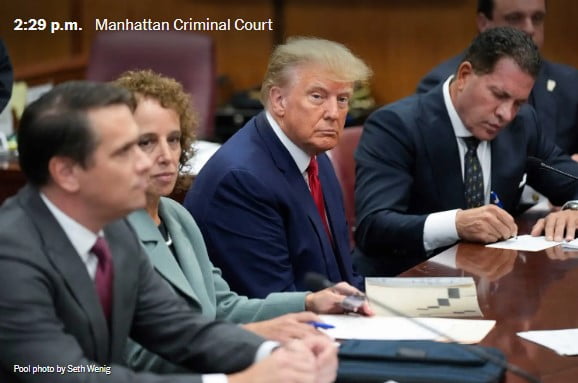
Originally published April 4, 2023
Apart from the angry politics on both sides of Trump being indicted and going to trial at some point in the future, there is an interesting issue to appears to my lawyer brain. There has been a lot of bellyaching about why would you bring this case first of all the cases against him? The general sense seems to be that this is the weakest of the cases against Trump and why not start with a stronger one.
One interesting issue is how prior convictions are used in actual trials in Court. Let’s start with assumption #1, which is that Trump will not ever plead guilty to anything. I think that is a given. A guilty plea and a jury verdict have the exact same effect so that does not matter too much assuming he is not aquitted. They both act as convictions. A guilty plea will usually get you a lighter sentence than a jury verdict, at least in Federal Court.
If Trump is convicted of a misdemeanor or felony before another case goes to trial, the fact of the conviction for a crime involving dishonesty could be used in future trials in Georgia or in the federal system to show that he is someone who has already been convicted and to show that he is someone who is willing to put his interests over those of society. Now, that may come as a surprise to nobody on either side. Nevertheless, the evidence of a conviction has the added effect of telling a jury that they too can convict him as a jury elsewhere already did that job once. It makes it a little easier to convict.
There will be a lot of argument over the admissibility in evidence of these convictions because if they form a pattern of behavior they become more likely to be admitted. If a defendant’s pattern of behavior suggests that he or she is more likely to have committed the crime on trial, it is powerful evidence. This rule of evidence, 404(b) in the federal system, is most commonly used in criminal cases, where the prosecutor can show that Jon Bad Guy always leaves a perfumed handkerchief at the scene, or only uses 22 caliber bullets etc. Here, if Trump was seeking to win the election in 2016 and was making efforts to do so by illegally paying off porn stars, how far would it be to say that he would break laws by coercing officials in Georgia to do something illegal in the next election? Not much of a stretch.
The other interesting aspect is that assuming Trump is convicted, his conviction should not result in jail time in New York state. Just no way. However, in the federal system, defendants with prior convictions get higher sentences and fines than first time offenders. So, there is this added wrinkle where Trump may not care about this case much, but may be very concerned about the timing of any conviction. So, as a lawyer, what do you do? I would guess that both convictions would have to be appealed to the US Supreme Court, which will take about 2 years or so. That would avoid all of the above scenarios as a conviction is not final until all appeals are decided. That is my guess. As I have said previously, the law grinds slowly but exceedingly fine. I am guessing we will see some convictions and fines, but I doubt there will be jail time at any point.
